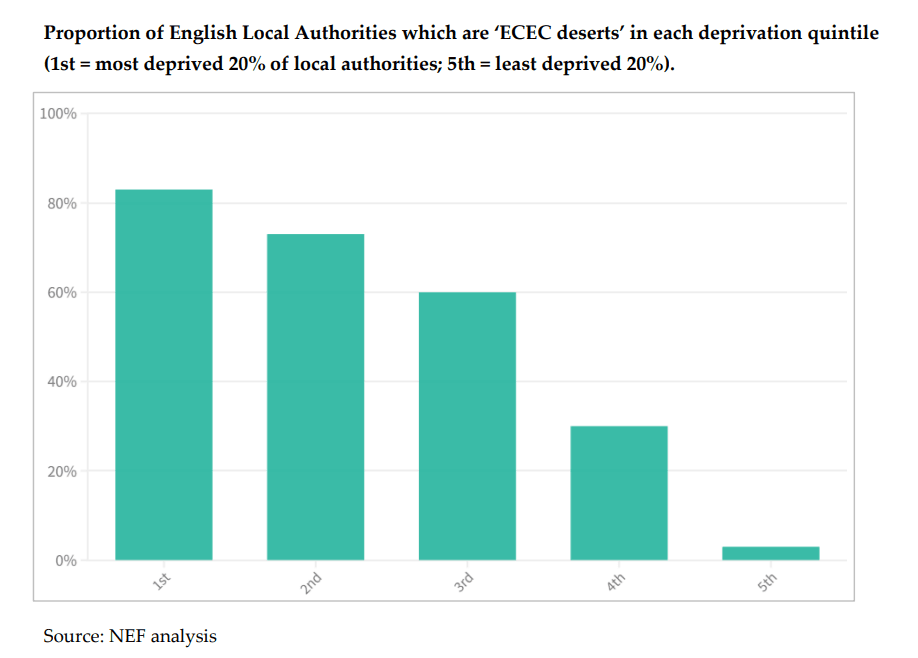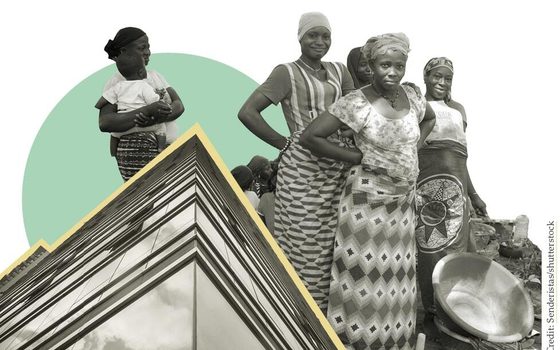Nearly half of children under five now live in “childcare deserts”
Areas where there are more than three children for every early year’s place are more likely to be in most deprived local authorities
20 November 2023
More than 1.5 million children in England are living in “childcare deserts”, where there are more than three children for every early year’s place, according to a major new report from the New Economics Foundation and The Social Guarantee.
Researchers found that 44% of children in England aged 0 – 5 lived in childcare deserts, which are more likely to be found in the most deprived local authorities, locking out the kids who stand to benefit the most and undermining the government’s own commitment to levelling up.

The report, A Fair Start for All, comes just months before the government’s expansion of free hours kicks in, adding to growing concerns that the sector won’t be able to keep pace with demand and that it will continue to be the poorest kids that lose out.
The report’s author and Head of Social Policy at the New Economics Foundation, Tom Pollard, said:
“It is no coincidence that childcare deserts show up in the poorest areas of England, when access to our early years education system is based on parents’ working status rather than children’s need. By keeping the poorest parents locked out from the full benefits of early years education, the government risks locking their children into a lifetime of poverty.
“The government’s plan to expand its childcare offer means that by the end of next year the state will be funding 80% of provision in England, making it a de facto public service. It would be inconceivable not to use that opportunity to deliver for the children who stand to benefit the most, and to help level up across our country.”
The report shows that for every pound that the government borrows and invests in early years education for children from low-income households, the Treasury receives £2.07 back in tax revenue. Conversely, it loses 33p for every pound it invests in children from high income households.
“The government has the opportunity here to do something truly transformative, by making early years education a universal basic service,” said Mr Pollard.
Notes
The New Economics Foundation is a charitable think tank who are wholly independent of political parties and committed to being transparent about how it is funded.
The full report can be read here: https://neweconomics.org/2023/11/a‑fair-start-for-all
The research used Nomis mid-year population estimates from the latest year (2021) which shows there are 3,716,730 aged 0 – 5 years in England: https://www.nomisweb.co.uk/
By comparing these Nomis figures at a local authority level the number of registered childcare places broken down by local authority from Ofsted’s ‘Childcare providers and inspections as at 31 March 2023’ (https://www.gov.uk/government/statistics/childcare-providers-and-inspections-as-at-31-march-2023) we found that 44% of this age group – 1.6 million children — were living in “childcare deserts”, areas where there are more than three children for every early year’s place
We mapped this against Indices of Multiple Deprivation rankings (https://www.gov.uk/government/statistics/english-indices-of-deprivation-2019 to show that the majority of childcare deserts where in the most deprived local authorities in the country.
NEF calculates the total fiscal benefits of investing in high-quality provision for children from low-income households at 2.07:1 over the course of their lifetime. In comparison, funding the same quantity and quality of provision for children from middle-income households would see returns of 1.19:1, while the government would lose about 33p for every £1 borrowed to spend on provision for children from high-income households
A recent report from the Early Education and Childcare Coalition found that almost 50,000 new nursery staff will be needed in 2024, and again in 2025, to keep existing places open for children and staff the additional places that will come from the expansion in early years funding announced by the Chancellor in the 2023 Spring Budget: https://www.earlyeducationchildcare.org/early-years-workforce-report
Topics Work & pay Social security Inequality






